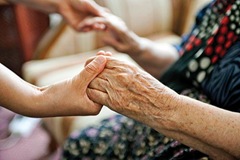Residential care: the future
 Statutory residential homes are to be phased out in a bid to modernise the Health Service and to ensure that the home is the ‘hub’ of care for older people.
Statutory residential homes are to be phased out in a bid to modernise the Health Service and to ensure that the home is the ‘hub’ of care for older people.
There are 52 statutory homes in Northern Ireland providing residential accommodation with board and personal care e.g. Pine Lodge in Belfast and Rectory Field in Derry. The Department of Health, Social Services and Public Safety has recommended that 28 should close over the next three-to-five years due to falling demand and rising maintenance costs.
As of 30 October the total maximum number of registered beds in those statutory homes was 1,349. The overall number of residential care homes (statutory and independent) was 222, with 4,464 spaces.
Following on from the 2011 Compton review, Health Minister Edwin Poots launched a wide-ranging consultation on 9 October, to run until 15 January 2013. ‘Transforming your care: From vision to action’ includes proposals on the future of residential care which would initially entail the closure of 28 homes, i.e. 750 places. It suggests restricting new admissions to statutory homes.
The population of older people (those aged 65 or more) in Northern Ireland is projected to increase by 42 per cent by 2025 and the population aged 85 or more is projected to rise by 51 per cent in the same period. Despite this, more than half the beds in a quarter of the statutory homes are currently empty and it is expected that demand will continue to fall as there is an increased emphasis on promoting independence and care in the home.
The consultation document states: “Many of the current statutory homes are over 50 years old and in need of significant investment which would be more appropriately directed to non-institutional, community-based services as this is what many people would prefer.”
These closures will not affect homes providing care for the disabled, those with mental ill-health, or those providing services for older people who are mentally infirm e.g. dementia sufferers.
While this “does not necessarily” mean a reduction in residential homes provided by the independent sector i.e. voluntary, charitable and private, for profit organisations, these should only be continued “where there continues to be a demand for these services,” the consultation document states.
Its key proposals include integrated care partnerships with GPs, community nurses and care managers working together to focus on how care is provided to frail older people. Reablement programmes would promote rehabilitation and independence, rather than unnecessary or premature reliance on services. The department predicts that this would ultimately reduce the number of older people who need long-term domiciliary care services by up to 45 per cent. The promotion of a wider use of telehealth and telecare would allow remote health monitoring and support people in their homes.
The department also plans to increase the opportunity for people to have self-directed support and individual budgets, giving individuals or carers more choice and control about the services they receive. Carers could also benefit from improved supports such as increased provision of respite and short breaks.
Edwin Poots told the Assembly that plans to allow more people to live independently in their homes will mean that the model of care must change. “It is crucial, however, that there are suitable, safe and better alternatives to residential care in place such as supported living, self-directed support and more respite care for those who need it,” he said.
Closures would be taken forward “in a planned and phased way, with residents, families and local communities involved in the local consultation processes.”
A questionnaire can be found at www.tycconsultation.hscni.net or answers and comments can be emailed to the TYC Programme Team through tycconsultation@hscni.net





